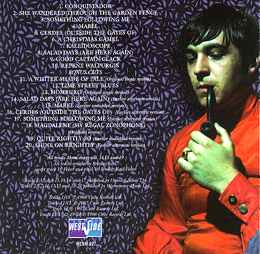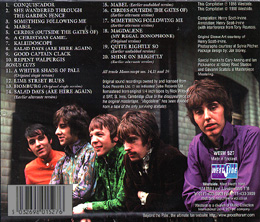Procol Harum ... plus!
Liner notes
| Sometime in 1962, Gary
Brooker formed the Paramounts. Loved by mods, they were,
in truth, an R&B / Soul covers band, enormously
popular in their hometown of Southend-on-Sea, Essex and
cited by the Rolling Stones as their favourite R&B
band. Many of the obscure, hip tunes that the group
performed were borrowed from Soho's Scene club DJ Guy
Stevens' record collection. |

|
It was at Stevens' flat that Brooker first met his future
writing partner Keith Reid in 1966. By this time Brooker was
writing tunes. However, like his contemporary counterpart Elton
John still at that time a relative obscurity he was
unable to write lyrics. Reid could and rather well! A partnership
was born and Procol Harum began to take shape ...
Within weeks of forming Procol Harum, Brooker and Reid's first
recorded composition reached the #1 slot on the British Pop
charts (on 10 June 1967). The fastest-selling single in the
history of Decca Records and released on their then-new
progressive Deram subsidiary A Whiter Shade Of Pale remained
at the top for six weeks before becoming a global hit of
incredible magnitude, allegedly selling in excess of ten million
copies!
In many ways WSoP defined the essence of the group:
dual keyboards, blue-eyed-soul vocals, a fusion of classical
themes with mid-60s R&B / Soul crossover and cinematic lyrics.
Its influence was enormous, and is reputed to have inspired,
among other notable events in music, John Lennon's penning of I
Am The Walrus. Elton John's lyricist, Bernie Taupin, rates it
as his favourite song of all time, and Jane Birkin and Serge
Gainsbourg's Je t'Aime Moi Non Plus owes it an
enormous musical debt. Countless covers of the song abound, some
of the most notable being by Percy Sledge, King Curtis, Joe
Cocker and Annie Lennox.
Riding the success of their chartbuster, Procol recorded their
debut album at Olympic Studios in Barnes, south-west London, in
the summer of 1967 at the heights of Flower Power. The group was
tied into an all-embracing deal with Essex Music. Said deal meant
that Essex not only owned the UK rights to the recordings, but
also furnished the group with management services via their
subsidiary Straight Ahead Productions. As a result, decisions
were often taken in the interest of Straight Ahead / Essex rather
than Procol Harum themselves. Consequently, instead of
capitalising on the success of WSoP Straight Ahead
Productions decided to delay the release of the album for six
months while they cut a suitable deal for the remainder of their
roster of new talent which included the then-relatively-unknown
T(yrannosaurus) Rex, Joe Cocker and The Move. Their course of
action meant that the album, which would have been ahead of the
field in the summer of '67, was almost ignored when it was
finally released on EMI's Regal Zonophone label in January 1968 [sic].
Procol Harum (the album) had been intentionally
recorded with a 'live' feel by producer Denny Cordell. The
acclaim that was heaped on the stereo version of the Beatles' Sgt
Pepper during the previous summer created a yardstick for all
subsequent production and engineering to be measured by, The
music press proceeded to pan Procol's début and one of
their criticisms was very valid. Worldwide superstars the Beatles
could afford to leave Strawberry Fields Forever and Penny
Lane off Sgt Pepper. Procol, however, could not afford
to lose Whiter Shade of Pale and its million-selling
follow-up, Homburg (a UK # 6) from their début LP. The
back cover of the album claimed that it should 'be listened to in
the spirit in which it was made'. This must have seemed like a
poor excuse for the omission of hits, as a well as a shoddy
apology for the delayed release of an album recorded quickly in
'live-in-the-studio' sound. It failed to chart in the UK in 1968,
but when re-released in 1972 paired as a 'Doubleback' with
A Salty Dog and now including WSoP it
reached #27 in the UK.
The rediscovery in late 1997 of an original, first-generation
production master of Procol Harum means that this CD
reissue offers the best-ever presentation of this material. The
songs are as magnificent as ever, and the performances among
Procol's finest. The opening track, Conquistador, provided
the group with their third top-thirty single on both sides
of the Atlantic when re-recorded with the Edmonton
Symphony Orchestra in 1971. Salad Days was used in an
obscure British Film Institute feature entitled Separation,
while Kaleidoscope, a minor masterpiece of psychedelia,
sounds as powerful today as it must have done thirty years ago.
Along with the rest of the album and a significant number of
bonus tracks including a number that have never been heard
prior to this release it forms an integral part of rock
history, and is reproduced for your delight with full digital
remastering.
The
bonus tracks
A Whiter Shade of Pale
A digital remastering of Procol's biggest hit. Two
hitherto-unreleased versions of the song one in
full stereo can be found on the aforementioned 30th
Anniversary Anthology set.
|

|
Lime Street Blues
This was the original 'B' side of the above. Both tracks [sic] feature session drummer Bill Eyden
who acted for Procol in this capacity on these two tracks only.
Eyden had previously occupied the drumstool for Georgie Fame and
the Blue Flames and coincidentally this record sounds not
unlike something that Fame might himself have recorded!
Homburg
The original recording of the group's follow-up to WSoP.
It features Bobby Harrison on drums and Ray Royer on guitar By
the time the record was released in October 1967, both men had
quit Procol to form Freedom. Two alternate takes of Homburg can
be found on the 30th Anniversary Anthology and these
feature Robin Trower and BJ Wilson on guitar and drums
respectively.
Salad Days (Are Here Again)
This is an alternate, much longer version, recorded in late
summer 1967. It again features Harrison and Royer alongside
Matthew Fisher, Dave Knights and Brooker. Along with other tracks
marked with an asterisk, it was mixed down from the original 4-track
session mastertapes by Nick Smith and Westside's Tony Rounce in
August 1997. It is probably the same basic recording as that
which is heard in Separation, although the film version is
not available for comparison at this time. The film itself was directed [sic] by the late Jane Arden, former wife
of noted UK TV director Philip Saville (Boys From The
Blackstuff etc.) and it also boasted a theme scored by
Matthew Fisher entitled Separation which can be found on
Fisher's eponymously-titled [sic]
solo début.
Mabel
This was cut at the same session as the above, and features the
same line-up of musicians. This alternate is similar to the
issued version, but is sparser lacking the many overdubs
that are a feature of the previously-issued version and
has a relaxed, live feel. Procol stopped [sic]
playing this Lovin' Spoonful-styled number shortly after Harrison
and Royer quit!
Cerdes
Once again features the Brooker / Fisher / Knights / Harrison /
Royer line-up, but was recorded at the same session as the next
track, on August 1st 1967 [see here]. The engineer for the session was one Gerald
Chevin.
Something Following Me
Another alternate take, SFM was the first song that Gary
Brooker and Keith Reid ever wrote together!
Magdalene (My Regal Zonophone)
Remastered from an original acetate featuring the Homburg
line-up, this was originally scheduled to be the follow-up to WSoP,
but the release didn't occur because the engineer accidentally
erased the mastertape after cutting the acetate! The group recut Magdalene
during the course of the sessions for what would become their
sophomore album, Shine On Brightly.
Quite Rightly So
The original undubbed version of the song some 30 seconds
longer than the one which became Procol's third single release in
the spring of 1968. According to the tape box, the song was
originally going to be titled An Ode by Any Other Name
which all fans will recognise as being a line from the
song's lyric. More alternate versions of QRS will be
available later in 1998 on Westside's special edition release of
the Shine on Brightly album (WESM 533)
Shine on Brightly
A real find, this. Recorded and mixed down for intended inclusion
on the album, it has been hidden away on the end of the
production master of PH that was in the vaults of Abbey
Road for almost 30 years, and was only unearthed when Carry
Anning and Ian Pickavance of the AR tape library conducted an
exhaustive vault trawl on Westside's behalf, in search of said
master.
If this doesn't whet you appetite for Shine on Brightly
... Plus! (WESM 533) then nothing will!
All recordings originally produced by Denny Cordell.
Asterisked bonus tracks mixed for issue by Tony Rounce and Nick
Smith at Hatch Farm Studios, Addlestone Moor, Chertsey, Surrey,
England, during August 1997.
All [sic] songs
composed by Gary Brooker (melody) and Keith Reid (lyrics) with
the exception of Quite Rightly So which was written by
Reid (lyrics) Brooker and Matthew Fisher (melody). Henry Scott-Irvine, December 1997
More about this album
Order this CD from Amazon
USA - or from Amazon
UK
Buy
the Procol Harum Pluss CD from CD-Now

